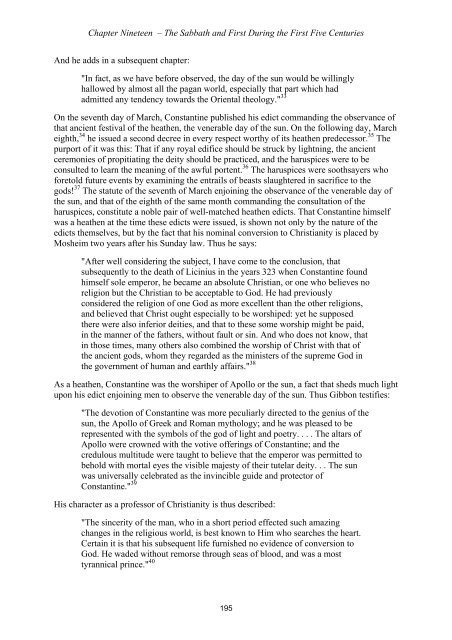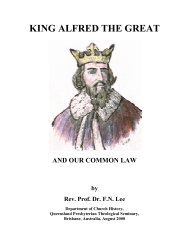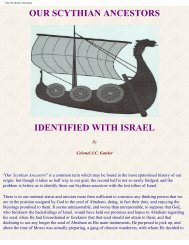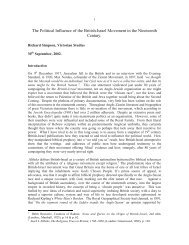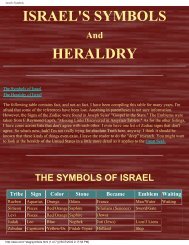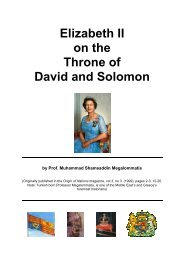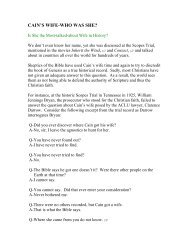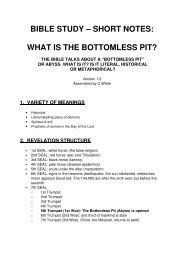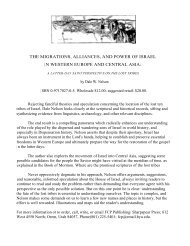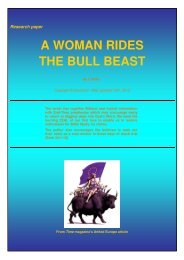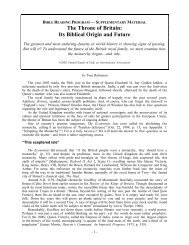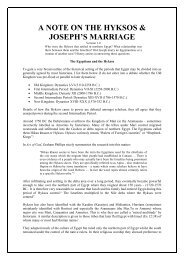HISTORY OF THE SABBATH - Friends of the Sabbath Australia
HISTORY OF THE SABBATH - Friends of the Sabbath Australia
HISTORY OF THE SABBATH - Friends of the Sabbath Australia
You also want an ePaper? Increase the reach of your titles
YUMPU automatically turns print PDFs into web optimized ePapers that Google loves.
Chapter Nineteen – The <strong>Sabbath</strong> and First During <strong>the</strong> First Five CenturiesAnd he adds in a subsequent chapter:"In fact, as we have before observed, <strong>the</strong> day <strong>of</strong> <strong>the</strong> sun would be willinglyhallowed by almost all <strong>the</strong> pagan world, especially that part which hadadmitted any tendency towards <strong>the</strong> Oriental <strong>the</strong>ology." 33On <strong>the</strong> seventh day <strong>of</strong> March, Constantine published his edict commanding <strong>the</strong> observance <strong>of</strong>that ancient festival <strong>of</strong> <strong>the</strong> hea<strong>the</strong>n, <strong>the</strong> venerable day <strong>of</strong> <strong>the</strong> sun. On <strong>the</strong> following day, Marcheighth, 34 he issued a second decree in every respect worthy <strong>of</strong> its hea<strong>the</strong>n predecessor. 35 Thepurport <strong>of</strong> it was this: That if any royal edifice should be struck by lightning, <strong>the</strong> ancientceremonies <strong>of</strong> propitiating <strong>the</strong> deity should be practiced, and <strong>the</strong> haruspices were to beconsulted to learn <strong>the</strong> meaning <strong>of</strong> <strong>the</strong> awful portent. 36 The haruspices were soothsayers wh<strong>of</strong>oretold future events by examining <strong>the</strong> entrails <strong>of</strong> beasts slaughtered in sacrifice to <strong>the</strong>gods! 37 The statute <strong>of</strong> <strong>the</strong> seventh <strong>of</strong> March enjoining <strong>the</strong> observance <strong>of</strong> <strong>the</strong> venerable day <strong>of</strong><strong>the</strong> sun, and that <strong>of</strong> <strong>the</strong> eighth <strong>of</strong> <strong>the</strong> same month commanding <strong>the</strong> consultation <strong>of</strong> <strong>the</strong>haruspices, constitute a noble pair <strong>of</strong> well-matched hea<strong>the</strong>n edicts. That Constantine himselfwas a hea<strong>the</strong>n at <strong>the</strong> time <strong>the</strong>se edicts were issued, is shown not only by <strong>the</strong> nature <strong>of</strong> <strong>the</strong>edicts <strong>the</strong>mselves, but by <strong>the</strong> fact that his nominal conversion to Christianity is placed byMosheim two years after his Sunday law. Thus he says:"After well considering <strong>the</strong> subject, I have come to <strong>the</strong> conclusion, thatsubsequently to <strong>the</strong> death <strong>of</strong> Licinius in <strong>the</strong> years 323 when Constantine foundhimself sole emperor, he became an absolute Christian, or one who believes noreligion but <strong>the</strong> Christian to be acceptable to God. He had previouslyconsidered <strong>the</strong> religion <strong>of</strong> one God as more excellent than <strong>the</strong> o<strong>the</strong>r religions,and believed that Christ ought especially to be worshiped: yet he supposed<strong>the</strong>re were also inferior deities, and that to <strong>the</strong>se some worship might be paid,in <strong>the</strong> manner <strong>of</strong> <strong>the</strong> fa<strong>the</strong>rs, without fault or sin. And who does not know, thatin those times, many o<strong>the</strong>rs also combined <strong>the</strong> worship <strong>of</strong> Christ with that <strong>of</strong><strong>the</strong> ancient gods, whom <strong>the</strong>y regarded as <strong>the</strong> ministers <strong>of</strong> <strong>the</strong> supreme God in<strong>the</strong> government <strong>of</strong> human and earthly affairs." 38As a hea<strong>the</strong>n, Constantine was <strong>the</strong> worshiper <strong>of</strong> Apollo or <strong>the</strong> sun, a fact that sheds much lightupon his edict enjoining men to observe <strong>the</strong> venerable day <strong>of</strong> <strong>the</strong> sun. Thus Gibbon testifies:"The devotion <strong>of</strong> Constantine was more peculiarly directed to <strong>the</strong> genius <strong>of</strong> <strong>the</strong>sun, <strong>the</strong> Apollo <strong>of</strong> Greek and Roman mythology; and he was pleased to berepresented with <strong>the</strong> symbols <strong>of</strong> <strong>the</strong> god <strong>of</strong> light and poetry. . . . The altars <strong>of</strong>Apollo were crowned with <strong>the</strong> votive <strong>of</strong>ferings <strong>of</strong> Constantine; and <strong>the</strong>credulous multitude were taught to believe that <strong>the</strong> emperor was permitted tobehold with mortal eyes <strong>the</strong> visible majesty <strong>of</strong> <strong>the</strong>ir tutelar deity. . . The sunwas universally celebrated as <strong>the</strong> invincible guide and protector <strong>of</strong>Constantine." 39His character as a pr<strong>of</strong>essor <strong>of</strong> Christianity is thus described:"The sincerity <strong>of</strong> <strong>the</strong> man, who in a short period effected such amazingchanges in <strong>the</strong> religious world, is best known to Him who searches <strong>the</strong> heart.Certain it is that his subsequent life furnished no evidence <strong>of</strong> conversion toGod. He waded without remorse through seas <strong>of</strong> blood, and was a mosttyrannical prince." 40 195


